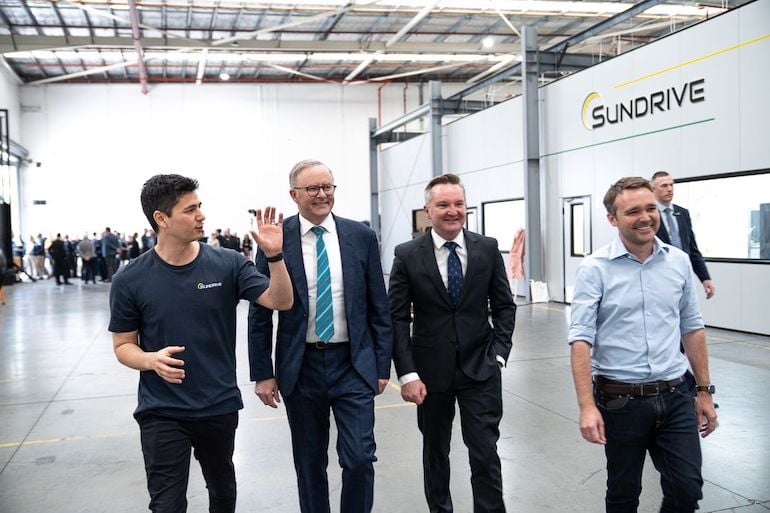Here’s an astonishing figure. While a third of Australian households have solar power, making us the world leader on adoption, just 1% of those panels are locally made, even thought we invented the technology.
So the federal government is hoping to transform the coal mining Hunter Valley region, north of Sydney, into a solar manufacturing centre, investing $1 billion in what it’s called the “Solar Sunshot” program.
Albanese, at the closed Liddell power station said Solar SunShot will help Australia capture more of the global solar manufacturing supply chain through support, including production subsidies and grants.
When AGL shut down Liddell last April, it announced plans to turn the site into an industrial renewable energy hub, including a 500 MW grid-scale battery.
“Australia should not be the last link in a global supply chain built on an Australian invention,”Albanese said.
“Places like the Hunter that have powered our nation for more than a century will power our future. We have every metal and critical mineral necessary to be a central player in the net zero transformation, and a proven track record as a reliable energy producer and exporter.
“We can also invest in strategic manufacturing capability, particularly in components critical to the energy and economic transition, like solar panels.”
Central to that plan is AGL and NSW solar startup SunDrive – companies Atlassian’s Mike Cannon-Brookes has substantial stakes in.
AGL signed a Memorandum of Understanding (MOU) with SunDrive to look at setting manufacturing facility at Liddell – rebranded as the Hunter Energy Hub Advanced Manufacturing Precinct – kicking off with a feasibility study
The MOU also includes AGL to purchase SunDrive’s unique solar panels for AGL’s customers. AGL now has around 600,000 residential and business customers with solar.an initial
It’s two years since Cannon-Brookes launched an audacious $5 billion takeover bid for AGL via his family VC fund, Grok Ventures. It was futile with two bids rejected, Cannon-Brookes spent $650 million to acquire an 11% stake. But he was ultimately successful campaign against AGL’s demerger plan along with a subsequent board shakeup with four Grok-backed directors appointed in the wake of the chair and CEO resigning.
SunDrive raised $21 million in a Series , in 2022, backed by former PM Malcolm Turnbull, Cannon-Brookes, Canva’s Cameron Adams, Tesla chair Robyn Denholm and the Clean Energy Finance Corporation. Blackbird has backed it since 2018’s Seed round and then a $5 million Series A in 2020. CSIRO-backed Main Sequence is also on the share register.
Late last year, the government-backed Australian Renewable Energy Agency (ARENA) handed over an $11 million grant for SunDrive’s Sydney commercialisation plant. The climate tech startup’s genius is developing solar panels that could be 20-30% cheaper than existing ones by using copper, rather than silver, in the production process. The solar PV industry uses around 10% of the world’s silver and copper is nearly 100 times cheaper than silver and far more abundant.
AGL CEO Damien Nicks said the agreement with SunDrive could be a major play in energy transition.
“If successful we will create new jobs and careers in the renewables industry as together, we build a new solar manufacturing industry and hub right here in the NSW Upper Hunter region,” he said.
“Our vision for the Hunter Energy Hub is to create a low carbon integrated energy hub – designed with circular economy principles – that brings together industries that can make a positive contribution to the energy transition, including renewable energy generation, grid-scale batteries, green advanced manufacturing, and associated industries.”
The broader Solar Sunshot announcement was welcomed by business leaders in the region.
Business Hunter CEO Bob Hawes said the project is placed in an optimum point in the energy network and able to draw on renewable energy produced at Liddell.
“This is going to be a major step in helping the economy achieve net zero whilst ramping up industrial output in a new industry,” he said.
“We know there are opportunities for workers and local businesses, so we welcome this investment announcement from governments today.”
The energy transition and closure of local coal mines that were the Hunter’s employment base for more than a century – especially as industrial manufacturing in the nearby port of Newcastle evaporated – has also been front of mind for the community.
Hunter Jobs Alliance coordinator Justin Page said a return to manufacturing, rather than just installation, was needed to provide long-term jobs.
“We have started to see decent investment in the Hunter region for renewable energy builds, like the renewable energy infrastructure on the site of the old Liddell power station, and in the areas of wind farms and hydrogen fuel production,” he said.
“This investment by the Albanese government is welcome news in the Hunter region, as we have a proud history of manufacturing and proven industry building capabilities. Strategic investment in a future proof manufacturing industry is exactly what the Hunter and Australia needs, and this large commitment at the federal level will bolster our ability to create jobs for the long term in the Hunter region.”
Alongside the federal plan, the NSW Labor government is running its own NSW Net Zero Manufacturing Initiative, with the $275 million up for grabs in the first round to support workers, small businesses, manufacturers and innovators to take advantage of the transformation of our energy grid.
Stage 2 will see the state work with industry to leverage government procurement to offer offtake agreements to local manufacturers of renewable products and low carbon materials.
Meanwhile, the feds have tasked ARENA with working with industry to design and deliver the initiative, asking it look at the entire solar construction supply chain. Consultation is expected to kick off in mid-April.




















Trending
Daily startup news and insights, delivered to your inbox.